SERIES REVIEW – Despite living to be a matousalian age, AMC’s flagship zombie series has been defunct for some time now – even with its numerous spinoffs, of which many more are still to come. Now, after the final episode of the original series’ 11th season, we write our thoughts on one of the most eye-opening yet controversial series of all time, which has been with us for 12 years.
In 2009, AMC debuted with a new slogan: “It’s the story that counts.” Launched during the season 2 finale of Breaking Bad, which was just one of several prestige shows that recently made a big splash on the channel, it echoed a similar slogan announced by HBO in 1996: “This isn’t TV, this is HBO.” Both suggested a critical sense of self, dictating that while the rest of television is mixed, these channels have narratives that can be relied upon to the maximum. Within a few years of this landmark mantra being established, HBO became home to The Sopranos, Deadwood, and later Game of Thrones. And a few years later, AMC was airing Mad Men, Breaking Bad, and The Walking Dead.
A zombie series where the story is essential, but too much emphasis is placed on “survival”…
This latter series is essential because zombie films (and the horror genre in general) are not typically praised for their storytelling. Of course, this attitude is somewhat misguided – horror has as rich a vein of good stories and characters as any other genre – one need only think of George Romero’s Dawn of the Dead or Yeon Sang-ho’s Train to Busan as truly influential zombie films. But this was a zombie story brought to TV as a series, a relatively new concept. Although it was based on the hugely popular comic book series by Robert Kirkman and Tony Moore, there was a chance that The Walking Dead would test AMC’s new slogan.
And he did… again and again. The Walking Dead’s finale was a long time coming (even as it marched on with three spinoff series and three more in the pipeline), and the fact that it continued its march of the dead long after its contemporaries had finished their own episodes calls into question the thematic backbone of the whole thing: how long does a story about survival have to go on?
Because what started out as an instantly acclaimed series that seemed to rewrite the rules of what is familiar on TV has turned into a clichéd example of a series that overdoes “survival” – I mean, not as a survival horror, but as a series that is overly drawn out, with too many seasons.
It started with a veteran, professional director…
From the start, the hype around The Walking Dead was not just limited to high production values and top-quality special effects makeup. The showrunner was Frank Darabont, director of films such as Prisoners of Hope, Death Row, and The Fog, who was a master of adapting the zombie comic. Kirkman was also heavily involved in the series, as executive producer and episode writer for the first few seasons, as a final expression of his blessing (although he ended up getting involved in a mega-suit against the network, which at this point had become almost a habit). And by the end of the first season, there was talk of Stephen King (to whom Darabont owes much of his filmography) writing an episode for the second season.
With the 11th season of The Walking Dead over, it’s hard to really grasp what made the series so enticing, to begin with. For many, it’s a favorite form of apocalypse, with a killer virus too out of control or a nuclear annihilation that leaves you feeling too helpless. But zombies? You have to stab them or shoot them. Anyone with the instinct for life, a stabbing tool, and a firearm in their hand and not afraid to use it can do it, right?
Sudden, shocking death…
However, as exciting as Rick Grimes killing a zombie horde was, it could have become dull in the long run unless The Walking Dead invented the then-novelty storyline: anyone could die at any time. It’s heartbreaking at first: Andrea is forced to stab her sister turned zombie, Morgan is unable to shoot his undead wife, who shuffles towards their once-shared home, and Rick stabs his former best friend Shane to death because his desperation for a new reality has pushed his buddy beyond the bounds of sanity, etc. All of this is presented in maximally dramatic scenes, with long, drawn-out, tense standoffs and plenty of crying afterward. The end result of all this is real tension and catharsis, especially for someone new to this kind of ‘prestige’ TV (as it was called in those days) – which, judging by the skyrocketing ratings for The Walking Dead, was typical of many.
And one of the hallmarks of this “prestige TV” was that it allowed for risky narrative choices that the larger channels would have shied away from. The Walking Dead took this to the extreme, and, as with Game of Thrones a year later, there was a constant rebuke for the show’s creators for killing off major, beloved characters in sudden and shocking ways.
Pyrrhic victories
However, the difference in attitude between the two series becomes apparent over time. Game of Thrones turned out to have a slightly more thematic weight and a more elaborate universe than The Walking Dead, where the “life is cruel, and it will make you cruel” narrative keeps coming back. It is a nihilistic approach where a shockingly demoralizing event often punctuates most moral or physical victories. The little girl, Sophia, whom the characters spend half a season looking for, turns out to be just a zombie in a barn beside their lodgings. Rick’s wife gives birth to their new daughter but dies after a brutal Caesarean section and is shot by her son to prevent her resurrection. The list goes on, but one thing becomes clear: every climax in the series, no matter how long the build-up, is doomed to be short-lived. Perpetual frustration and a taste of Pyrrhic victory are the keywords here.
Of course, it’s all quite realistic. Whatever one’s visions of one’s own triumph over the undead, the most certain reality is the miserable one. Narratively, however, this means playing tug-of-war with the nature of fiction itself. The arc of a typical story allows for growth, recognition, and change. The world where the story ends is supposed to be different than where it started. (Except, of course, in open-world video games.) But by being so much of a “You know what? It’s still almost the same horror! ” narrative is typical, you’re embarking on a weird Pavlovian dogfight. The bell rings, and you already instinctively expect to be disappointed with what you get. And in a few seasons, it will come back to damage the series significantly.
Darabont was “killed” and then “walked away”
But the most important killing did not happen in front of the camera. The second season began with Darabont being fired from the series, disappointed with both the budget and the creative path AMC wanted to take. His plans apparently included something with a bit more leeway (the idea for the new season’s first episode was to largely abandon the main characters for a while and instead focus on a group of doomed soldiers fighting a futile war against an onslaught of zombies in Atlanta). What followed was a costly legal battle between Darabont and AMC, which was settled in 2021 for $200 million.
Tellingly for the timing, the episode in which Darabont left was the start of Talking Dead, an aftershow dedicated to praising and discussing the evening’s episode with cast and crew, and the first step in the subsequent realm of the TV series.
Darabont’s departure didn’t seem to shake any of the fundamental pillars of The Walking Dead, especially since the series followed many of the comics’ essential motifs and story elements. Yet as the series progressed, shock and unexpected deaths became its most critical pillars. For the first few years, it followed a formula: survivors find a new location to hole up in and a few more survivors to take in with incredible difficulty. Then the area becomes poisonous or too dangerous, and many people die, either from zombie bites or from hostile humans; the characters (or what’s left of them) are forced to move on. From the camp to the farm, from the farm to the prison, from the prison to Alexandria – in season five, the main character Rick says to the others, “We are the walking dead,” and as silly as it sounds for one person to say that to another, it’s true. They are not so different from the army of corpses they are trying to resist. All they can do is trudge from one place to the next and hope they don’t get murdered at the next stop.
In the grand scheme of things, the first half of the series is characterized by the same narrative exhaustion as the last half. One thing was different, however: a rise in ratings that played out like an arms race for popularity against itself. The first season finale became the most-watched episode in the series history in the adult 18-49 demographic. The season two finale delivered AMC’s highest ratings ever, surpassed only by the season three premiere. And the first episode of season seven achieved the second-highest ratings in series history, thanks to the cliffhanger ending of the previous season. By the end of season seven, those ratings had almost halved…
Glenn’s death was fatal
The death of Glenn, a fan favorite and by far the most sympathetic character in a sea of increasingly grim macho posturing, was not necessarily shocking when it occurred in the Season 7 premiere. In the comics a few years earlier, it had been precisely the same, right down to Glenn heartbreakingly shouting his wife’s name in between baseball bat blows to the skull. But what was supposed to be the energetic emergence of Negan, the adoringly hated terrible guy who had been building up for an entire season, played by the highly charismatic Jeffrey Dean Morgan, was widely reviled. The series, which constantly ‘poked fun’ at its own characters, eventually went too far.
The difference between Glenn’s death and the deaths of the characters in The Sopranos or Deadwood is that in those shows, the deaths meant something to the other characters, and they meant something to the story as a whole in that they were more significant than mere, horrible deaths. The Walking Dead, on the other hand, apart from a few angry characters, didn’t bring any major catharsis or fundamental change after Glenn’s brutal killing. With just one more main character killed off since the end of the first season, the circle has been closed, but without a more critical or meaningful conclusion.
The nature of comic storytelling, even finite storytelling like Kirkman’s (which ended with issue 193 in 2019), is cyclical. As part of longer story threads or long-running series, a return to the status quo is needed from time to time to allow new readers to get on board. But what if the status quo, like that of The Walking Dead, is based on the idea that there really is no status quo? Even a return to normality means layers of intense mourning and displacement and offers little hope that anything will improve.
With Glenn’s death, whatever “magic tricks” the series makers had up their sleeves, the public was then exposed. It always has been and always will be; there is no real surprise, catharsis, or anything else we, viewers, can expect. The characters you like are doomed; moreover, it seems as if the makers decide their fate with their heads or writing. The Walking Dead season 8 poster promised an “ALL OUT WAR” between Rick and Negan’s groups, which would have been the dramatic climactic end to the series so far. But viewers are used to shocking endings. Not even the titanic battle between the vengeful, tenacious protagonist and the most monstrous villain promised to change the nature of the story.
Glenn’s death has wiped out something intangible from the series in an elemental way. The most significant difference between the later episodes and the earlier seasons is the introduction of more human factions. This gives the impression that the series has managed to turn the small groups struggling on the ‘walker-infested’ East Coast into something resembling a return of community in a chaotic world. In principle, this could have been a logical and workable change if it hadn’t brought a truly sweeping change in the fundamental nihilistic nature of the series that could have made it more interesting.
“Spinoffs”… spinoffs everywhere…
Meanwhile, a spinoff series, Fear the Walking Dead, rumbled on. A few years later, it was joined by The Walking Dead: World Beyond and Tales of the Walking Dead, neither offering much of a departure from the original series. Even the various characters were replaced in a Marvel Cinematic Universe-like attempt to provide a watchable component for those hesitant to spend more time on another aimless zombie series.
In the meantime, the producers didn’t hesitate to touch the real main character of the series (Andrew Lincoln, who decided to leave the series simply because he couldn’t be with his family due to the remote location). In season 9, after Rick’s apparent “death,” he was taken away in a mysterious helicopter to an unknown location, a creative decision that left viewers wondering (now can Rick come back?) until they read that Rick would be the main character in another spinoff (where, hopefully, the problems involving Andrew Lincoln’s family and residence would be resolved.)
This was the final short circuit that prevented the final seasons from ever returning. If they couldn’t correctly say goodbye to Rick, the one character who has been around since the first episode and is the backbone of the series, what was the point? Why was it still happening if the characters’ survival depended on who got the associated series? It’s no exaggeration: surviving until the last episode are Daryl (gets a spinoff,) Michonne (similarly disappeared from the series and now joins Rick in his spinoff,) Negan (gets a spinoff,) and Maggie (accompanies Negan, the man who violently beat her husband to death in another weird spinoff. What an odd couple). If The Walking Dead is doing nothing but preparing its stars for adventures in an expanded universe, why does the ending even matter? To protect the characters through sheer franchise-ization thus effectively betrays what was once the most powerful element of the series: anyone, at any time, can die in it.
The Walking Dead’s existence now feels as archaic as the rotting undead that walks in it, a reminder of a series that, while far from hopeful in its early years, remained vibrantly creepy and energetic. In the end, the only thing The Walking Dead failed to survive was its own success.
-BadSector-
The Walking Dead
Direction - 7.2
Acteurs - 7.1
Story - 6.4
Visuals/Action/Horror - 9.2
Ambience - 6.8
7.3
GOOD
The Walking Dead's existence now feels as archaic as the rotting undead that walks in it, a reminder of a series that, while far from hopeful in its early years, remained vibrantly creepy and energetic. In the end, the only thing The Walking Dead failed to survive was its own success.

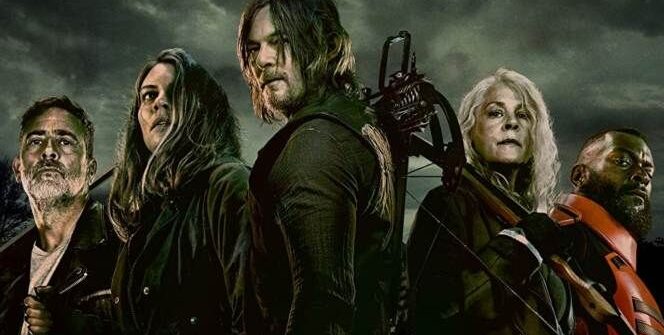
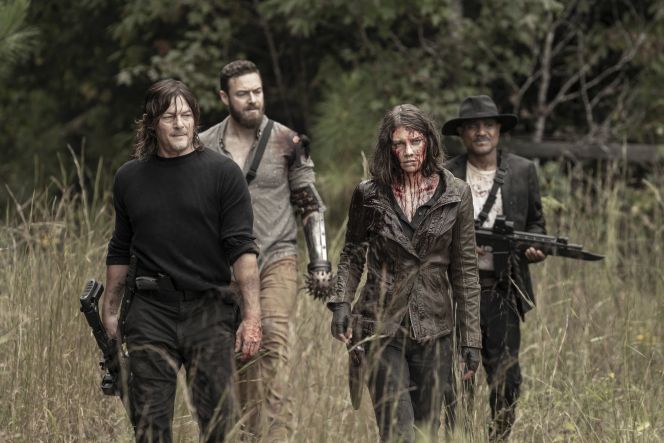
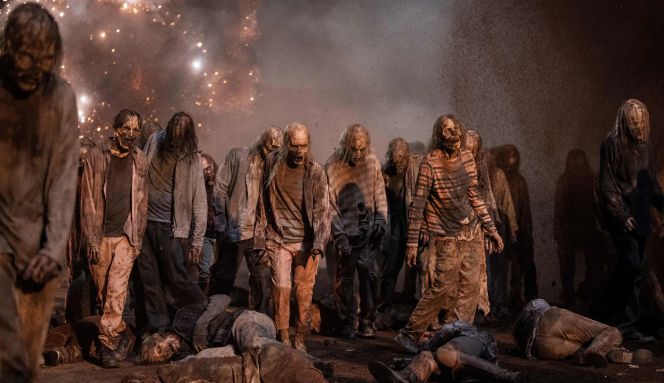
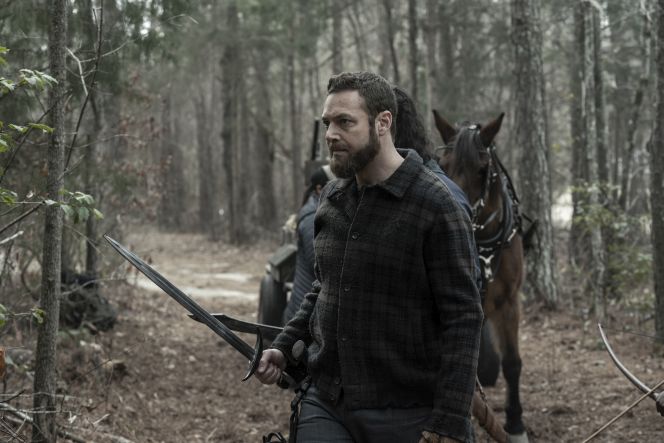
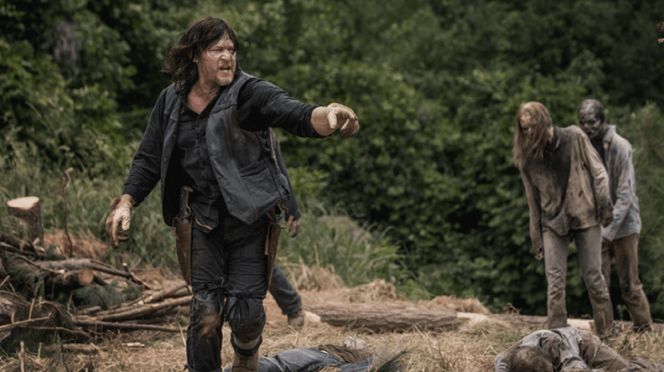
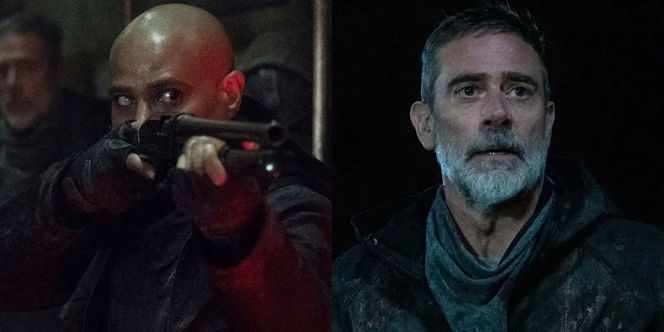
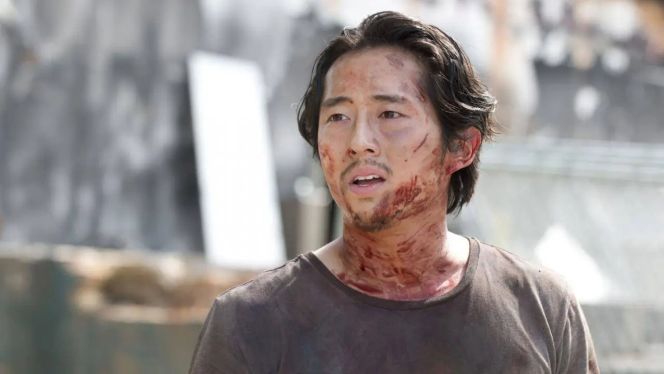














Leave a Reply